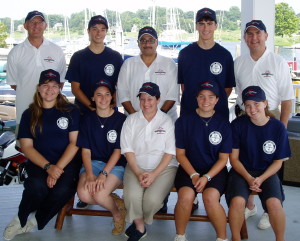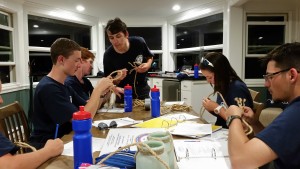The SEAL training program is designed to teach leadership skills while underway. SEAL is designed to “jump start” the junior leaders of new Ships and to fine tune leaders of experienced ships. It is a physically and mentally demanding, and remarkably rewarding hands-on leadership experience. New and experienced Sea Scouts will succeed at SEAL so long as they are willing to learn and work hard at preparation.
History and Purpose
 In 1996, the National Sea Scouting Committee created a new youth leadership course called Sea Scout Advanced Leadership (SEAL) training. The course is designed to develop leadership skills in young adults. Seamanship is the medium through which the course is taught; however, nautical skills are the means, not the end. This course, which utilizes an “at sea” experience as a laboratory, is intended to teach and apply leadership skills. There are few other media offering the opportunity for young people to actually put leadership skills utilizing group dynamics into practice. In SEAL, there is no “play acting.” All situations and tasks are real, not created. Bad decisions or team failure can produce immediate and real problems.
In 1996, the National Sea Scouting Committee created a new youth leadership course called Sea Scout Advanced Leadership (SEAL) training. The course is designed to develop leadership skills in young adults. Seamanship is the medium through which the course is taught; however, nautical skills are the means, not the end. This course, which utilizes an “at sea” experience as a laboratory, is intended to teach and apply leadership skills. There are few other media offering the opportunity for young people to actually put leadership skills utilizing group dynamics into practice. In SEAL, there is no “play acting.” All situations and tasks are real, not created. Bad decisions or team failure can produce immediate and real problems.
Curriculum
This week long “at sea” experience allows the student to learn and apply new skills immediately. Courses consist of five to seven youth with a Course Skipper and two instructors. Each instructional module relates to a specific leadership skill with exercises designed to show mastery of the concepts taught while under the leadership of the boatswain of the day. SEAL is NOT a seamanship course. All applicants are expected to have basic seamanship skills prior to arrival.
Skills Taught
| Evaluation | Team Building | Leadership |
| Training | Communicating | Goal Setting |
| Planning & Preparing | Motivating | Managing, Supervising & Commanding |
| Counseling | Implementing & Re-Implementing | Problem Solving |
Preparing for SEAL
 SEAL candidates must arrive at the course prepared to learn, lead, and excel. It is not a seamanship course and all candidates must become intimately familiar with the Safety & Seamanship chapter and appendix of the current Sea Scout Manual. Candidates will be required to outline the chapter in detail. Additionally, candidates must be able to perform basic coastal navigation on paper and must be able to tie all knots required for Apprentice Sea Scout and Ordinary Sea Scout ranks. They must know and understand the basic nomenclature of a sailing vessel; know and understand helm commands and points of relative bearings. All of this information is in the Sea Scout Manual.
SEAL candidates must arrive at the course prepared to learn, lead, and excel. It is not a seamanship course and all candidates must become intimately familiar with the Safety & Seamanship chapter and appendix of the current Sea Scout Manual. Candidates will be required to outline the chapter in detail. Additionally, candidates must be able to perform basic coastal navigation on paper and must be able to tie all knots required for Apprentice Sea Scout and Ordinary Sea Scout ranks. They must know and understand the basic nomenclature of a sailing vessel; know and understand helm commands and points of relative bearings. All of this information is in the Sea Scout Manual.
Conducting the Training
This course is managed by the National Sea Scout Committee and has been conducted at Chesapeake Bay, the Texas Gulf Coast, the Pacific, the Ohio River Valley, Florida Keys, Long Island Sound, and the Great Lakes. Course dates vary but are always held in the summer months. Costs are typically from $250 to $290 not including candidate transportation to and from the course.
Requirements
- Achieve Ordinary rank by June 1st the year of the course
- Apply leadership skills with their ship after the course.
Before Students Arrive
The student will:
- Prepare an outline of “Chapter 4” of the Sea Scout Manual to be forwarded to the course’s Skipper for evaluation.
- Know basic nomenclature of a sailing vessel.
- Know and be able to perform basic coastal navigation.
- Be able to tie all knots required for Apprentice and Ordinary ranks in less than three minutes.
- Know standard helm commands.
Two practice tests are sent to the applicant’s Skipper prior to the course that cover seamanship covered in “Chapter 4” of the Sea Scout Manual and basic coastal navigation. The student’s performance on these practice tests helps the student know better how to prepare for the course.
Goals
By the end of the course, graduates will be equipped with leadership skills and management tools necessary to fire up a ship’s program. They will be prepared to serve in leadership positions such as boatswain or boatswain’s mate in their ships as well as in their schools, jobs, and communities.
Recognitions
Each graduate receives the coveted SEAL pin. SEAL patches are also available to graduates, which can be worn on their uniform instead of the pin.
Applications
Applications are due each year by March 1st, and are available now. All courses are posted, and the applicant must list their preference in priority order. If two or more Scouts from the same ship are applying, they should apply for different locations.
Preparing for SEAL
The Skipper’s evaluation of the candidate’s readiness for SEAL is critical. The application consists of an admonition and instructions to the Skipper regarding evaluation of the applicant. Preparation and full readiness regarding the knowledge of seamanship as set out in the Safety & Seamanship Chapter of the Sea Scout Manual and coastal piloting is absolutely essential prior to arrival at the training site. Failure to fully prepare ensures failure of this course and the waste of a valuable space for someone else that would have been able to participate.
To assist candidates’ preparation, two tests are forwarded to their Skipper. The first tests the candidates knowledge on the Safety & Seamanship Chapter of the current Sea Scout Manual, the second tests their knowledge of basic coastal navigation. In the navigation test, candidates will set a course, compute speed, time and distance, compass error, a fix by two lines of position and finding latitude and longitude. These tests are used by the candidate and the Skipper to determine the candidate’s readiness for SEAL. Using the results of the test, the Skipper can tell if the candidate needs help before she reports to SEAL training.
Upcoming SEAL Courses